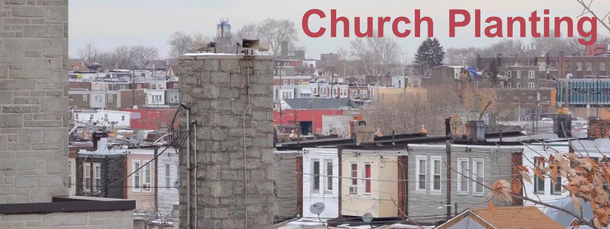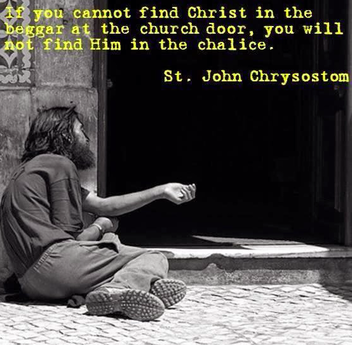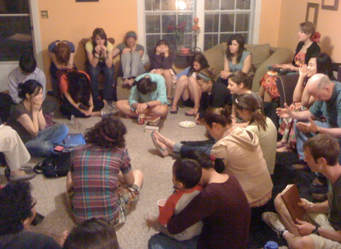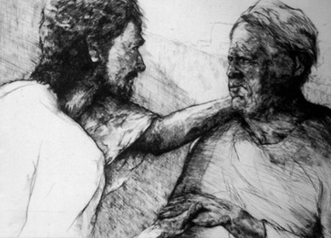|
0 Comments
Think about this: In Mark 1:40-45, Jesus touches the leper BEFORE he makes him clean. This order is everything—and it is instructive to us as church. Typically, both as individuals and as church (and I mainly want church to hear this), we welcome others into our circle of affections after they are clean first—then we touch (welcome, embrace). Here in Mark 1, Jesus is approached by a leper and touches him and then he makes him clean. Everyone else saw a leper; Jesus saw a human being. This is church, people. We welcome others into our circle of affections and care and embrace before we judge or evaluate them. We see human beings, made in the image of God, first. This order is everything. This is the gospel. This is church. And, if we want to have people freely talk about us (our church) and the news of our gospel to spread, this order is everything—and then we will see people coming to Jesus from “every quarter,” every neighborhood.
 Some exegetical fun with Matthew 3:3: The ESV and almost every Bible version I can find translates Mat 3:3: “The voice of one crying in the wilderness: ‘Prepare the way of the Lord; make his paths straight.’” The Greek is pretty close (almost dead on) with the Isaiah 40:3 of the LXX (i.e., the Greek translation of the Old Testament): φωνὴ βοῶντος ἐν τῇ ἐρήμῳ ἑτοιμάσατε τὴν ὁδὸν κυρίου εὐθείας ποιεῖτε τὰς τρίβους τοῦ θεοῦ ἡμῶν (LXX) What our modern Greek version of Matthew 3:3 does (which is reflected in the English translations) is to put in commas where there wouldn’t have been commas in the original Greek Matthew. And, the modern Greek version makes a capital Ἑ (epsilon) to give the impression that’s where the “quote” starts (Ἑτοιμάσατε, “Prepare”). This would not have been the case in the original as well. However, if we leave things as they are (or were, that is), the “quote” could have started (and probably was meant to be understood) at “In the wilderness,” which more accurately follows the Hebrew of Isaiah 43:3: A voice cries: So, John, as Matthew probably intended, was more likely heralding, “In the wilderness prepare the way of the Lord!”
Why is this important? Because this, (i.e., “in the wilderness,” “in the desert”), is where God’s royal road was to be built (cf. Isaiah 40). The “desert” (the “wilderness”) is the prophet’s way of referring to the chaos of the uncreated world of Genesis 1:1 and the condition of the land now inhabited by people that had returned to “chaos” and darkness, a land lacking water, a dry place (spiritually and actual) where God must recreate. Jesus is introduced into a place, a desert (if you will), where he will recreate a people for his Father’s glory. Both Isaiah and Matthew are drawing upon this Genesis creation. This is church. This is church planting. This is more, an intentional church planting in the hinterlands, as Sean Benesh wrote, in “the uncool places.” “In the wilderness prepare the way of the Lord.”  "Therefore welcome one another as Christ has welcomed you, for the glory of God" (Ro 15:7). This is church language. A gathered-church. The context: Some were NOT welcoming others. So the word to church: "welcome those whom you are not welcoming." Negative application: What are our attitudes and actions NOW that communicate "you're unwelcome here" or prohibit the welcome of those we are not welcoming (those not like us/those we hate/those we in-some-way-look-down-upon)? Discover, lament, repent. Positive application: Intentional action that welcomes those unlike us whom we are not currently welcoming. My theology and understanding of the New Testament brings me into places and near people that I, otherwise, probably would not be. Sometimes this scares me, not because I am uncomfortable (and I am often uncomfortable as I should be or I am not learning from my theology and understanding of the New Testament), but because I am empty of solutions or resources or practical-on-the-spot comfort.
Children's message at service yesterday:
Kids, I want to ask you a question (like I usually do), but I want you to pause and really think about your answer. When you walk into a room, into a home, into a party, into any place where there are other people (your age), what's the first thing you ask yourself? Of course I spent a little time explaining what "ask yourself" means because they don't even know they are "asking" anything. Had plenty of puzzled looks for the most part . . . but I knew they'd get it when I told them what I thought their first question to themselves would be . . . I said, "When you walk into a room, into a home, into a party, into any place where there are other people (your age), don't you ask yourself, 'Are my friends here?' (Parents, don't we even ask this?)" You can see their minds work by their eyes and facial expressions. O yeah! Lots of nodding yes. They got it . . . so did the adults . . . Of course I said this is natural and not a bad thing . . . but that can stop us from asking other questions like, who is lonely here, who is not liked and needs a friend, who is uncomfortable here and needs someone to talk to . . . This is what Jesus did for us: he came into the party, knowing full well he didn't have any friends there, and asked, "Who is lost? Who needs a friend?" This is church, people (now I'm not talking to the kids, but you, blog friends). Maturing in Christ means getting beyond "who are my friends?" and "are my friends here?" And this is also about maturing as a church, as a gathered-church. “Blessed are the poor in spirit, for theirs is the kingdom of heaven” (Matthew 5:3).  The way some Christians talk and make comments about this verse . . . you’d think that Jesus said, “Blessed are the ones who recognize their spiritual poverty and got themselves together, for theirs is the kingdom of heaven . . . “ NOT (at all)! When we teach that Jesus meant that “we are all spiritually poor” we rob both the rich (the opposite of poor) and the poor (the opposite of wealthy) of God's word to them––no one ends up “Blessed.” 1) For the one, the poor, this is a text of hope and of life, that God's got their back and that the world (this present world) isn't all it seems to be; 2) for the other, the rich, this text is an awakener (more a judgment), that they are on the wrong side of God's history. The rich are robbed of faithful discipleship when they think (and we teach them so), this text is about them. The rich-turned-follower of Jesus ought to read this text (and the remainder of the Sermon on the Mount) and ask, “How do I bring my life into alignment with the world Jesus envisions?” Not, “Phew, I get my spiritual poverty fixed, plus I get to stay rich AND inherit the kingdom of heaven.” Who wouldn't want a deal like that! Spoiler alert: the rich were the only ones to inherit anything anyway, so in some way they already had the “inheritance.” In fact, in the Greco-Roman world, the elite and wealthy were the only ones to get the world to come. Inheritance was the language of the rich, not the poor, which would have indicated how subversive Jesus' vision of the world would have been. The crowd Jesus preached his Sermon on the Mount to seems mostly made up of the crowd he was just previously ministering to in chapter 4: And he went throughout all Galilee, teaching in their synagogues and proclaiming the gospel of the kingdom and healing every disease and every affliction among the people. So his fame spread throughout all Syria, and they brought him all the sick, those afflicted with various diseases and pains, those oppressed by demons, those having seizures, and paralytics, and he healed them. And great crowds followed him from Galilee and the Decapolis, and from Jerusalem and Judea, and from beyond the Jordan . . . Seeing the crowds, he went up on the mountain, and when he sat down, his disciples came to him. And he opened his mouth and taught them, saying: “Blessed are the poor in spirit, for theirs is the kingdom of heaven . . . (Matthew 4:23-5:3). There is no doubt that both in the historical occasion (i.e., the scenes depicted in the text above) and for the "crowd” listening to Jesus' sermon, they understood to whom he was referring when he mentions "the poor.” Most likely "poor in spirit" reflects the Isaiah 61:1 that was promised and Jesus quoted to refer to Himself: "to bring good news to the poor; he has sent me to bind up the brokenhearted."
So, to hear and apply this beatitude (as well as the rest), we need to stop taking the poor out of the poor and making it everyone (because, you know, everyone is spiritually poor before God–just stop it!). This only cheapens what Jesus said–and no one gets blessed. |
AuthorChip M. Anderson, advocate for biblical social action; pastor of an urban church plant in the Hill neighborhood of New Haven, CT; husband, father, author, former Greek & NT professor; and, 19 years involved with social action. Archives
February 2024
Categories
All
|
Pages |
More Pages |
|


 RSS Feed
RSS Feed